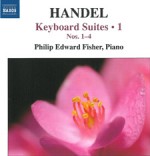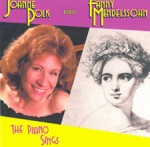Column Name
Title
Handel Keyboard Suites 1: 1 to 4. Philip Edward Fisher, piano. (Naxos 8.572197)
Body
Anyone noticing the explosion of copyright law issues in the news might ponder the fact that this is not a recent phenomenon. Consider the predicament of George Frideric Handel’s keyboard suites—the so-called “eight great suites”—published in 1720. The composer felt compelled to release them in the wake of illegal, pirated copies of the scores making their way around the world. Lucky listeners now have the chance to hear the first four on piano, played by Philip Edward Fisher, who received his master’s degree from Juilliard in 2006.
Throughout this set, Handel’s contrapuntal brilliance comes through strongly, helped by Fisher’s exacting rhythmic control and clear articulation. Fast movements are executed with impressive control and occasional ever-so-slight rubato for emphasis. The bubbly second movement Allegro of the Second Suite will bring a smile to all but the most soberly inclined. Yet he brings out the composer’s ability to suddenly touch the heart, such as in the two meditative Adagios in the same suite. In the final one, Fisher emphasizes the wistful Sarabande by deploying a gentle, yearning quality that is irresistible.
The longest of the four, the Third in D minor, deploys a seven-movement structure, and it, too, has a rapt, thoughtful slow movement, a lengthy Air that might be the climax. And although a traditional Allemande and Courante make appearances, Handel adds a short set of variations (Doubles Nos. 1-5), and caps it off with a festive Presto.
Such care and precision bodes well for Volume 2. Although Fisher is known for his affinity for contemporary music, he clearly has the measure of these Baroque gems. And talent aside, he is very well recorded, with lots of detail, by Jonathan Allen of Abbey Road Studios, here working at Birmingham’s Symphony Hall in the U.K.
Joanne Polk Plays Fanny Mendelssohn. (Newport Classic NCD 60180/2)
One could be forgiven, stumped trying to name female composers of the early 19th century—since there weren’t that many. Fanny Mendelssohn Hensel (1805-47, and sister of Felix Mendelssohn) ultimately surmounted more obstacles than gender (notably, anti-Semitism) before she decided to remain a composer. How lucky we are that she prevailed, since she left a substantial legacy: more than 450 pieces, including some 125 for piano.
Pianist Joanne Polk, who received both her bachelor’s and master’s degrees from Juilliard, made a big splash in the late 1990s with her cycle of the complete works of Amy Beach, and also recorded some of Clara Schumann’s lieder with soprano Korliss Uecker. Here Polk proves a similarly persuasive advocate in this two-disc set with a substantial sampling of Hensel’s solo piano music, starting with the Songs for Pianoforte. All show the composer’s expertise with the instrument, and I found the sixth, a tango, humorously sly. The first disc is rounded out by three Lyrische Klavierstücke, and a trio of short études, charmingly shaped.
The second disc is equally pleasurable, starting with Four Roman Piano Pieces, influenced by Hensel’s 1839 trip to Italy, which by all accounts gave her compositional career a much-needed boost. The Virtuosic Piano Pieces show Hensel manifesting the family’s love of song, while creating instrumental challenges that truly tax the performer’s abilities. Each one is filled with elaborate arpeggios, flourishes, and note-happy stretches that are not for the timid.
But perhaps the most surprising aspect for most listeners will be discovering Hensel’s music itself. (Later this month, Juilliard is providing an unusual opportunity to do just that, in a three-concert series of her chamber, vocal, and piano music, performed by doctoral candidates at the School.) Anyone who admires her brother’s work will discover that she shares his gift for melody—overflowing in this well-chosen collection—as well as an unerring sense of proportion and balance. The ever-popular recital hall at SUNY Purchase gives Polk predictably winning sound, engineered by Lawrence Kraman.






